What we learned from Marine Le Pen and her nationalist friends’ visit to Romania
Michael Bird
They are against a united Europe, the ‘Islamisation’ of the continent and open borders. Many have attacked the eastern expansion of the European Union - so why have they come to Romania?
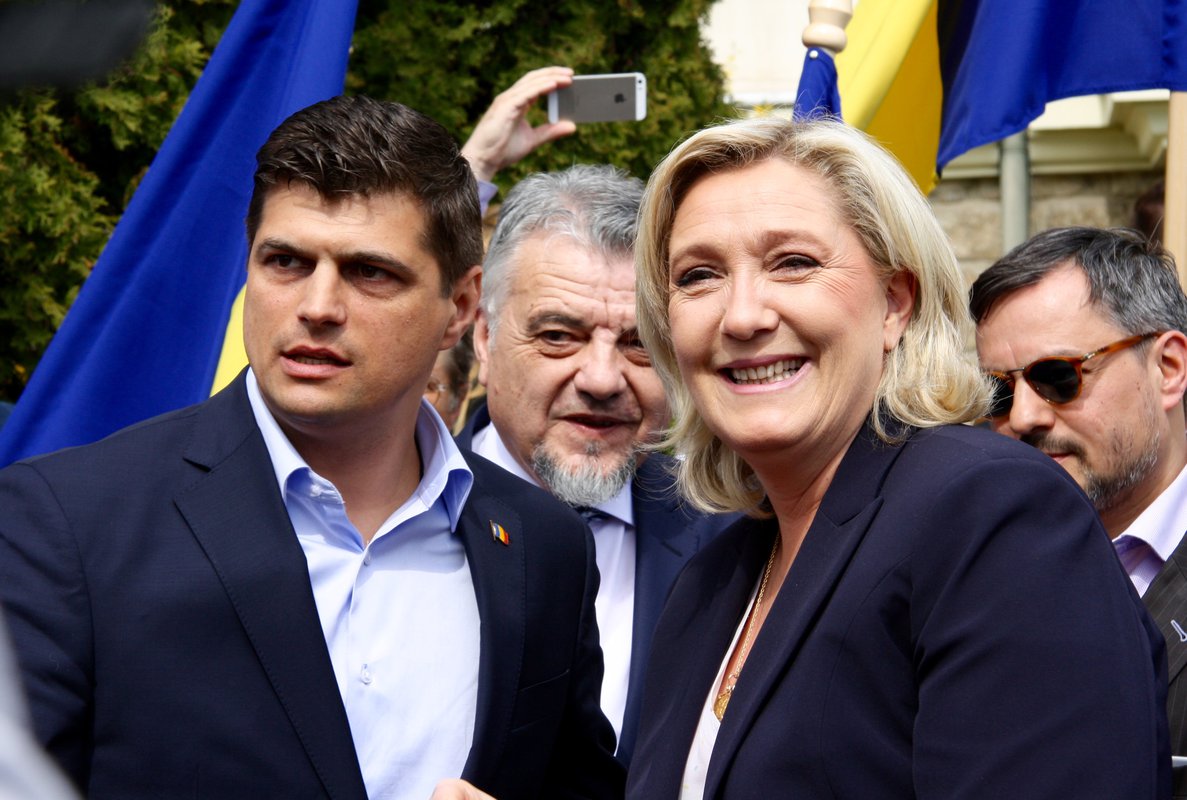
Marine Le Pen: praising Romanian Romantic verse after her father suggested Romanians were naturally inclined to steal (seen her with Romanian MEP Laurentiu Rebega, Picture; Michael Bird - MB)
Sinaia. Mountain resort and seat of the Romanian royal palace. In a packed conference hall of the lush 1912 casino, a cheering crowd watches dazzled in the dark as a giant screen flashes a countdown from ten to zero. A soundtrack of classical strings and electric guitars blasts out. The besuited crowd stands and claps in a staging resembling a product launch for a new home appliance.
Then Marine Le Pen, leader of France’s far right National Front, appears to give the keynote speech.
Nemesis of the European Union establishment, Le Pen is against NATO, against the EU and against the International Monetary Fund - the three international institutions arguably critical in securing Romania’s stability over the last 15 years.
Her presence seems out of place in a country where an ex-European Commissioner is now Prime Minister, an ethnic German is President and the country’s Anti-Corruption Department has locked up hundreds of the nation’s elite for bribery and fraud. Superficially, the country is a symbol of European Union values in action: transparency, technocracy and multiculturalism.
So what message can Le Pen and her nationalist colleagues in Europe’s Eurosceptic political family have for Romania?
Marine Le Pen: a “friend” of Romania
In 2013, Marine Le Pen’s father Jean Marie, the former leader of the National Front, was fined 5,000 Euro by a Paris Court for implying Romanians were “naturally” inclined to steal.
But his daughter’s first words to a Romanian audience in Sinaia are admiration for a figure she calls one of the world’s greatest poets - late 19th century Romantic Mihai Eminescu - a Romanian.
She adds that “we know very well that not all Romanians or Roma are criminals” - not exactly an unqualified message of support for her hosts.
Members of her political movement in the European Parliament - the Europe of Nations and Liberty - have attacked Romanians in the past, but the group’s delegates here see a potential ally in the fight against the ‘Islamisation’ of Europe - and they are oozing charm.
Geert Wilders, the firebrand president of the anti-EU Dutch Freedom Party, suggested in 2009 that Romania and Bulgaria should be chucked out of the EU, but his party’s representative at this conference, Markus De Graaff states: “We would love to do trade with Romania and let our economies grow together - for Bucharest [to be] a beautiful and prosperous city - as the Paris of the East again.”
This receives cheers from the locals.
The movement is selling a vision where countries can freely trade with one another inside Europe, but each can decide its own economic path. The ideal is that independence means cash.
De Graaff adds: “We want to be in charge of our own country again - more freedom and prosperity - our Europe - a Europe of nations.”
His final words to the audience are in Romanian. They are taken from the national anthem.
“Viața-n libertate ori moarte!”
Life in liberty or death!
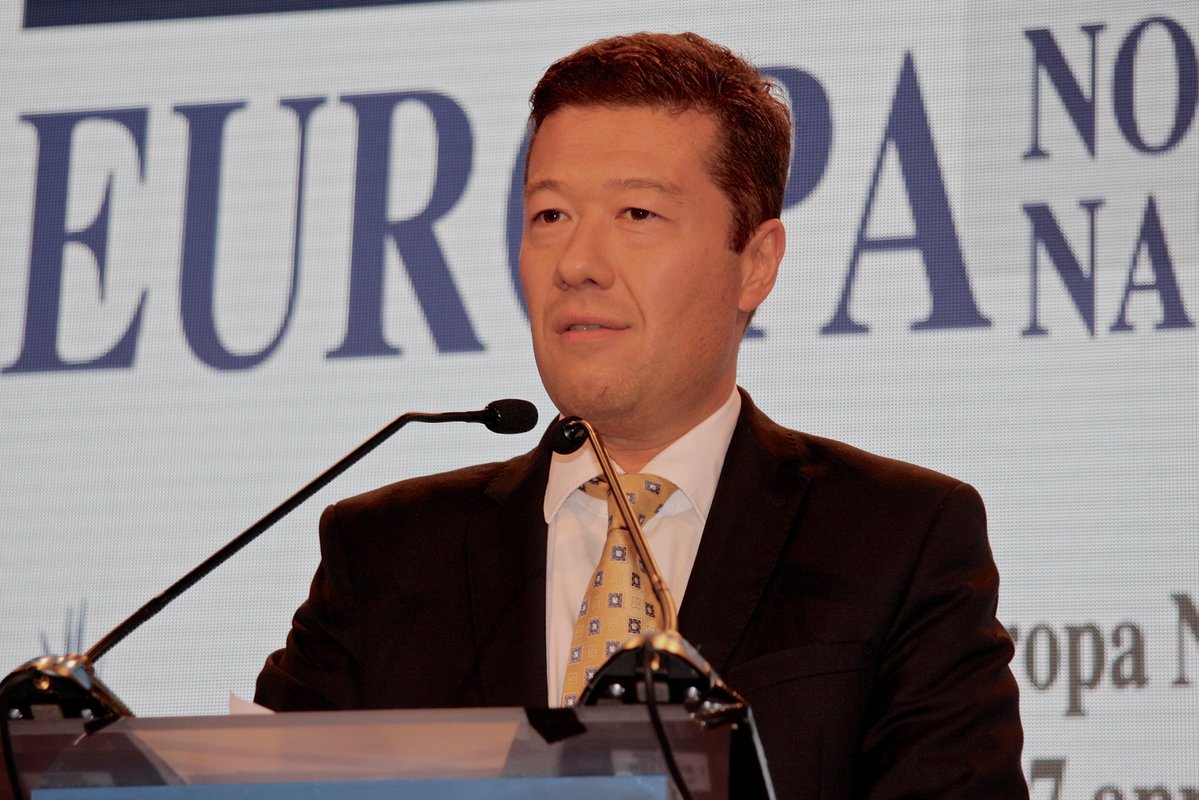
“The EU should identify Islam as an anti-democratic and aggressive ideology,” Tomio Okamura, Czech Republic (picture: MB)
Europe is being “invaded” by Muslims
Founder of the Czech Republic’s Movement of Freedom and Direct Democracy (SPD) Tomio Okamura is a soft-spoken self-made entrepreneur with a dazzling back-story.
From a Czech mother and a Japanese-Korean father, he is a former dustman, ex-popcorn seller, and a judge on the Czech version of reality TV show Dragon’s Den, where experts interrogate members of the public about their business ideas - then finance their dreams, or crush them. The 43 year-old has also written a book on Japanese cooking.
These are excerpts from his speech at the conference in Sinaia:
“We are at war. More and more [terrorist] attacks are being planned. Islamic radicals are being dispersed throughout the world and they begin to implement the next stage of the Islamic vision… The objective to conquer Europe remains… Muslim communities are a crucial security risk. It is important to create conditions where radical Muslims leave the country… Islam is incompatible with freedom and democracy and the European concept of human rights. The European Commission should analyze the Islamic ideology defining the points in which Islam is incompatible with European law and identify Islam as an anti-democratic and aggressive ideology.”
Another speaker, 59 year-old Johannes Huebner of the Austrian Freedom Party (FPO), adds that: “we have an invasion from the Islamic world - but also [from] the black African world - where 450 million people are waiting to migrate to Europe.”
Meanwhile his Dutch colleague Markus De Graaff states that, while recent refugees from crises in North Africa and the Middle East have gone to well-organised shelters, those others coming via illegal means to Europe are 'fortune seekers and Jihadists':“The first group drain our financial resources, driving up taxes and public expenditures and unemployment…the second group are Jihadists - the frontline of Islamic warriors. Their goal is to conquer Europe for Islam… and the first group support the second.”
As a caveat, Huebner - like many others in the conference - stresses that he is not against these people. “I can understand it,” he says. “If I was born in a slum in Freetown or Lagos or Kinshasa - I would love to come to Austria or Germany or Sweden or Bucharest or Sinaia - it is a good place.”
The message is that Muslims should stay in their own countries, Europe should end the Schengen space of free movement and each country should secure its own borders - and not let any more Muslims through.
On this issue, Marine Le Pen is careful. She has stated she is not against races, but against criminals and not anti-Islam, but against the Islamisation of Europe. She indirectly targets Islamic culture. For example, she calls the possibility of Turkey entering the EU “a disaster” and says Turkey’s attitude to Daesh (ISIS) is “more than suspect”.
At the conference she does not accuse anyone in the EU of allowing the recent terrorist attacks in France and Belgium, but instead states “EU ideology played a criminal role”.
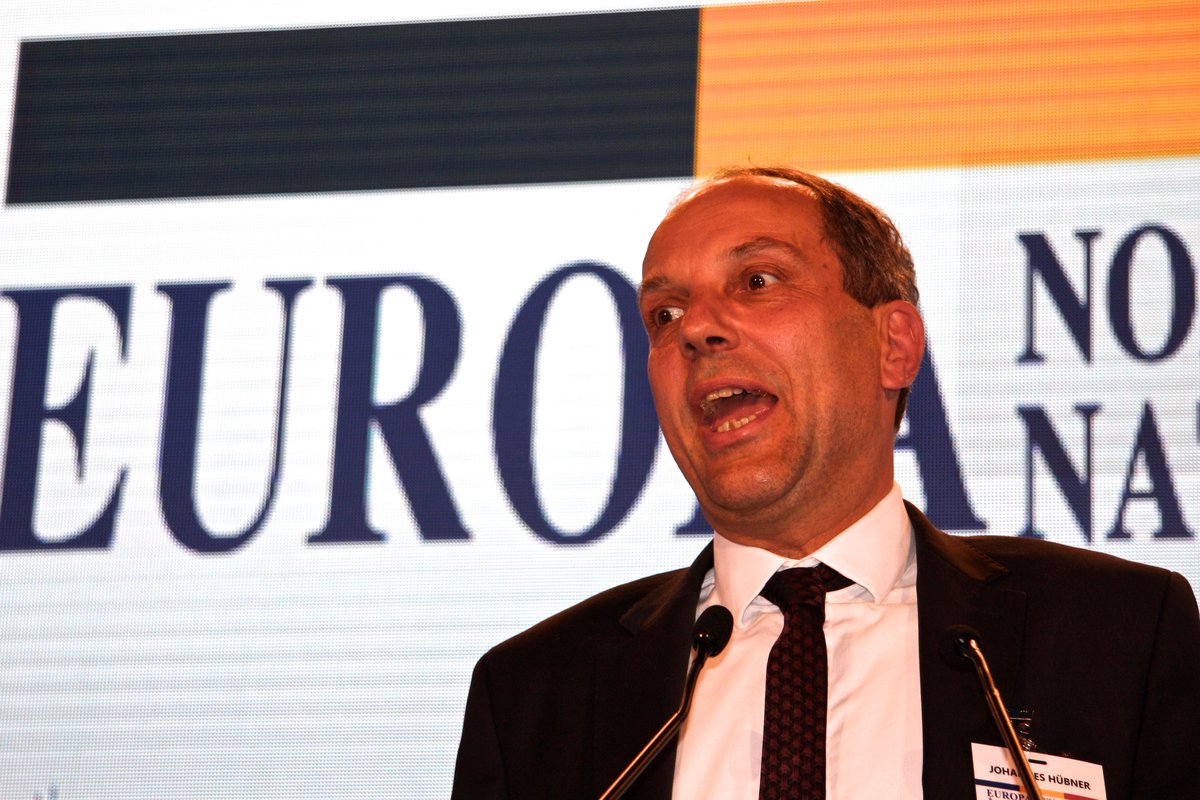
“We have an invasion from the Islamic world - but also [from] the black African world,” Johannes Huebner, Austrian Freedom Party (picture: MB)
Referendum: their strongest weapon
Europe’s far right has been energized by this month’s rejection in the Netherlands in a referendum on whether to allow the Ukraine–European Union Association Agreement.
This was seen as a victory for the country’s Eurosceptic and anti-Muslim Freedom Party, which opposed the deal - and a setback for Brussels.
In June, Britain will vote on whether to leave or remain in the EU. A negative vote for Brussels could trigger a collapse of the European Union project.
Le Pen confirms that her group wants referendums in each state on whether to stick with the EU.
“I hope the French will not wait too long for a similar opportunity,” she says.
The talk is now of the Netherlands pushing for a referendum - a so-called Nexit, which could be followed by Denmark (Dexit) or Sweden (Swexit) - a pattern which becomes harder to maintain when the neologisms turn to countries beginning with a vowel - such as Italy and Austria.
Even if Brexit does not happen, the media attention this will bring will inspire other far right groups to push for such a plebiscite in their own countries.
But democracy is not a science. Sometimes voters simply cast a vote to reject a decision - regardless of its content - due to their own disaffection towards their own situation in life.
Whatever the public’s motivation, ‘referendums’ are a brilliant weapon for these parties, as they come with the justification of being the result of the will of the people. And the delegates here make this point again and again.
Message to the east: the EU is the USSR
Le Pen wants European nations to “take the destiny in their own hands and have a collaboration between Europeans”. She calls the European Union an “excellent failure that destroys hope and development”, and that its elite believes "treaties are more important than people".
Romania has over two million people working in the EU, is now seeing growth of 3.6 per cent, primarily due to trade and investment from the bloc, and its people still overwhelmingly support the EU and NATO. But Le Pen's message is: this is not enough.
“Romania is a big country with a high potential and deserves more,” she says.
She compares the EU to the USSR. The intention here is to convince Romania that they have moved from being at the mercy of one superstate only to find themselves under the influence of another.
This view is backed by Janice Atkinson, a former-Conservative and UK Independence Party (UKIP) politician, who sends a message to the crowd arguing: “Romania has not shaken off the shackles of communism only to have them reimposed by the EU.” This is greeted by cheering.
But Atkinson’s own past includes targeting of Romanians for political gain. As a UKIP spokesperson, she sent out a press release in 2014 to constituents stating that "Ninety per cent of ATM [cash machine] crime is committed by Romanian gangs and drug and gun crime is mainly run by Eastern Europeans.”
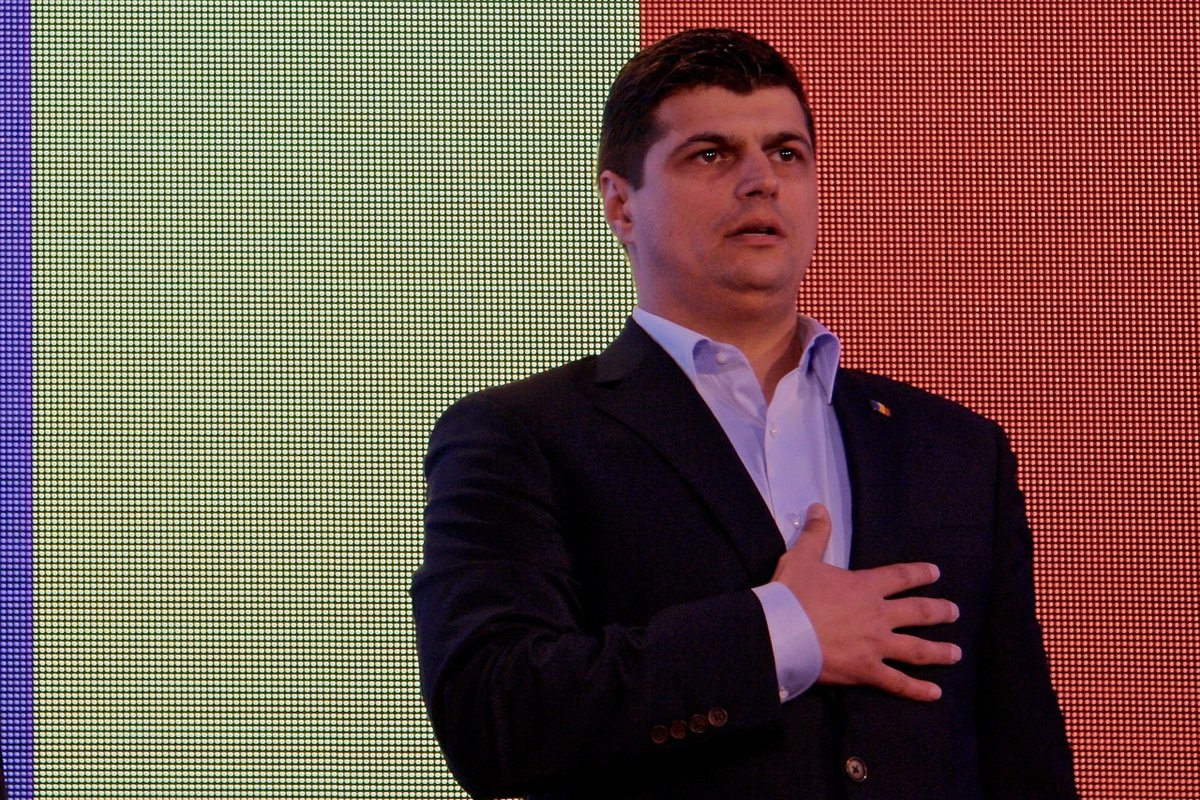
“We are not the ones who plant bombs,” Romanian MEP Laurentiu Rebega (picture: MB)
Romanian MEP Laurentiu Rebega is quite a powerful speaker
This event is organised by 40 year-old Romanian MEP Laurentiu Rebega, a former member of the Conservative Party - a tiny political movement which uses its media influence to form coalitions with larger parties to get its members into powerful positions.
A former agricultural consultant and ex-vicepresident of the country council of Prahova, Rebega is now VP of the Europe of Nations and Freedom.
In a stirring speech, he reiterates the message - seemingly directed at the media - that: “We are not extremists… we are not the ones who plant bombs. They are not due to Laurentiu Rebega or Marine Le Pen.”
Although his main argument seems to be ‘don’t call us extremist because we are not killing anyone’ he sends out a warning - that if forces in Europe try to eliminate his group, this will create a path for real right-wing extremists who will not respect the rule of law.
Instead he argues that his fellow members are ‘radicals’.
Rebega has the impassioned diction, clear message and a few rhetorical flourishes - repetition, brevity, the constant switch between fear and hope - that are the oratorial arsenal of Le Pen herself. The French politician seems to have faith in him as an ambassador of the nationalist cause to the Romanian people. But right now he seems to be a one-man army.
This is not a mass movement in Romania - yet
The right in Romania is divided. There are many new parties with a mix of Christian, Anti-Islamic, Nationalistic, and anti-EU messages. Some overtly invoke the symbols and ideology of Romania’s 1930s Fascist party the Legionnaires, others just seize its platform with the usual carefree attitude the country’s elite has towards plagiarism.
Recently members of the country’s larger parties have adopted elements of far-right rhetoric in their own speeches, especially against Muslims. Senior politicians and intellectuals have warned that Syrian refugees and their ‘Islamic’ culture will threaten the Orthodox Christian values of Romania.
The Romanian organiser of this event - MEP Laurentiu Rebega - is an independent backed up by only a small political movement. The audience at the conference is not swarmed with admirers. They include a few Le Pen groupies, a couple who have come back to Romania from Canada because there “were too many Muslims there”, ex-soldiers and some kids who seem to be from the local high school. Their loyalty to the cause is not too evident.
Outside the casino, when Marine Le Pen drives up in a mini motorcade, there are a hundred people - carrying just as many Romanian flags - who have been choreographed to form a crescent to welcome her.
One teenager, his head shaved on both sides, is brandishing the flag of ‘Europe of the Nations’ - a blue eagle on a white background, but he is also wearing a sweatshirt with the word ‘CRMINAL!’
As the French MEP exits her car, there are a few shouts of “Marine! Marine!”
But only about four or five.
She is not mobbed.
This is not The Beatles at Shea Stadium.
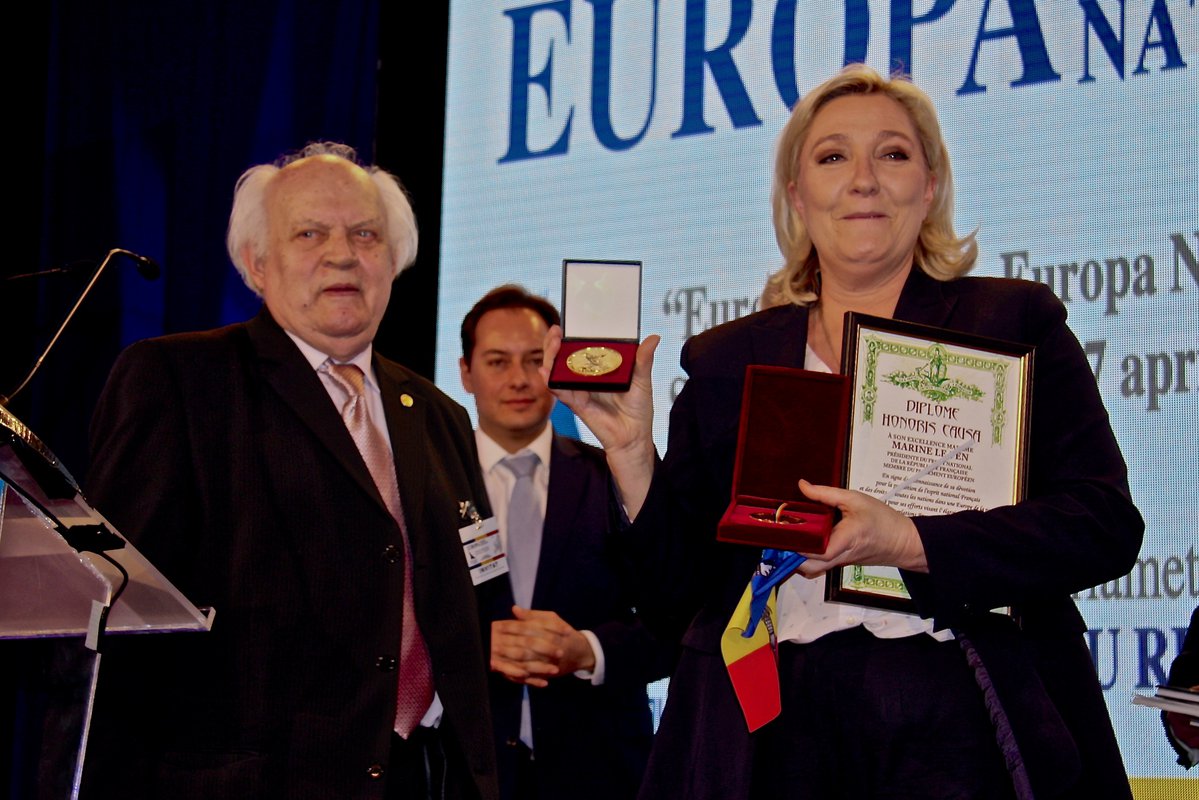
Le Pen overcome with awards from Romania, with academic Victor Craciun (picture: MB)
Romanians love giving awards to foreigners
When I was interviewing a European Ambassador to Romania in his Embassy many years ago, he led me to a corner of his office, and said: “And now I would like to show you my awards.”
On a table were dozens of framed diplomas, winged plastic statues, and thick brass medals, which he had received since heading up the mission.
But he was not bragging about his achievements. Instead - he was confused.
“I don’t understand,” he told me. “I can’t go anywhere in Romania, without someone giving me an award.”
During this event, Le Pen becomes the target of this national trait.
At the climax, Romanian General Mircea Chelaru - who was last yearcondemned to a suspended sentence on corruption charges - and local academic Dr Victor Craciun present to Marine Le Pen a Doctorate Honoris Causa, the medal of Eminescu-Iorga, along with another award, and a plastic Romanian flag adorned with a Dacian wolf. The 80 year-old Craciun even cheekily plants a kiss on Le Pen’s face.
Although she is clearly overloaded, she doesn’t put any of the awards down - perhaps fearful she will offend someone. Then she drops a case on the floor and a medal skips across the stage.
I feel sorry for her.
Follow us